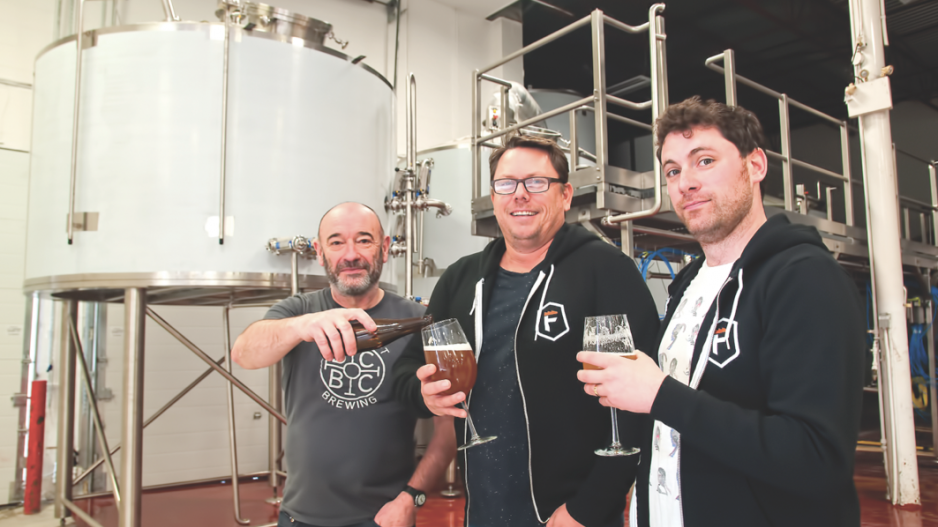Next to Portland, Â鶹´«Ã½Ó³»has solidified its place on the map as one of the Pacific Northwestâs most diverse and bustling craft beer scenes.
Yet stiff competition, rising costs of business and real estate and looming market disruption from legal cannabis have all put pressure on Â鶹´«Ã½Ó³»brands to innovate and experiment. Experimentation has consequently become a key selling point among craft brewers.
Last year, Factory Brewing Ltd.launched in East Â鶹´«Ã½Ó³»as a contract brewery for microbrewers to brew off-site to help alleviate their limited production capacity. A year later, Factory felt the pressure to establish its own brand.
âItâs at the point now in Â鶹´«Ã½Ó³»and all across Canada in that you canât survive just because you are there,â said Stephen Smysnuik, director of marketing and brand development at Craft Collective Beerworks. Smysnuik is also the founder and former editor of Glacierâs craft beer guide, The Growler. âIt is an increasingly crowded market. The consumer is a lot more savvy and educated than they once were, and there are some people that are making some really good beer.â
Craft Collective Beerworks merges contract brewing and sales for other brands and its own proprietary brands.
âBefore we were primarily a contract brewer,â Smysnuik said. âBut this year we decided that it made more sense to create our own brand and bring other brands into the fold as a way to weather the stormy waters of the beer industry.â
The companyâs refocused approach calls on craft brands to wear multiple hats to reduce costs and push profits.
Smysnuik said it also follows the principle that connecting the community of brewers together will benefit everyone.
âThe need to expand in order to continue to grow is complicated by restrictions, legislation and zoning... It makes more sense for us to group together, to band together and share costs.â
Recently, popular Vancouver-based brand Postmark Brewing, which has become a staple establishment in Vancouverâs Railtown neighbourhood.Ìý
Postmarkâs founding partners, Steve Thorp, Nate Raymentand Reuben Major, will continue to own and operate the brewery site at 55 Dunlevy Ave., including the tasting room and retail site.
But the acquisition will free up production space, which owners will transform into the âPostmark Innovation Facility,â essentially building on the growing popularity of experimental beer âlaboratories.â
Like many craft production facilities around the city, the brewery has become a supermarket for beer-related needs. Retail sales of products made in house are sold on site, as are retail products such as clothing, and food. The tasting room and experimental side is another element aimed at bringing customers to the bricks-and-mortar venue.
This is especially the case at 33 Acres.
âWe will make a beer once, one time, and if we like it, cool ... and if we really like it, we might make it again someday,â said Dustin Sepkowski, operations manager at 33 Acres Brewing Co.
The 33 Acres group recently opened a location beside its current local hot spot on West Eighth Avenue in Mount Pleasant, but the company stressed it is not an expansion.
âIt is a whole new business with an independent licence through the provincial government, so the beers we make there are independent of 33 Acres,â Sepkowski said.
By applying for a new licence and producing product outside the original brand, 33 Acres can create brews that might never make it to sale or further distribution.
âWe get a whole new tasting room, another maximum 80 square metres that allows us to have another storefront and increase that immediate access to market,â Sepkowski said.
Craft brewers are facing a crunch given the realities of operating retail and production facilities in desirable areas of downtown Â鶹´«Ã½Ó³»but, according to Sepkowski, there is far more value in local companies helping each other as opposed to exporting to international markets.
âWe only sell our beer in the area of Vancouver. We have a few stores and restaurants we sell to in North Â鶹´«Ã½Ó³»and Burnaby⦠but we have always focused on keeping our beer in the city of Â鶹´«Ã½Ó³»so that we can maintain its freshness and its regular rotation, and it is supporting our community at the same time.âÌý
Ìý
Ìý



